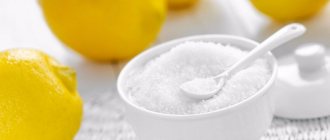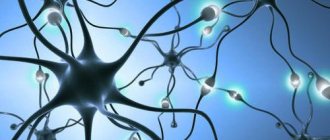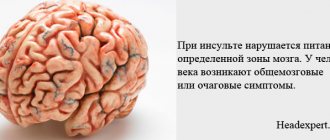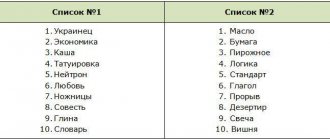Memory impairment in adolescents
Often, parents of teenagers begin to notice that their son or teenage daughter has begun to remember certain events worse, that they are poorly absorbing the material, and that previously excellent students at school are “slipping” into C grades... This phenomenon is called hypomnesia - memory loss or dysmnesia - memory disorders.
Memory is a special property of a person, which is represented by a complex of special processes in the cerebral cortex, thanks to which previously learned information is remembered, stored and reproduced. Problems can occur at the memorization level, storage level, or all processes at the same time. Memory disorders in adolescents have many causes, and parents are not always able to connect the events occurring with their child and subsequent disorders in the nervous system. A teenager is no longer quite a child; the demands placed on him have already expanded - both in school, at home, and among his peers. However, comparing it with an adult is also wrong - this is still an immature organism, the nervous connections are not fully formed and the functioning of the nervous and endocrine systems is unstable.
Memory loss in a teenager that occurs suddenly and strongly requires mandatory consultation with a neurologist. The fact is that memory disorders can be symptoms of mental illness, which, fortunately, is quite rare. Very common causes of memory impairment are head injuries - bruises, concussions, which require mandatory medical consultation and treatment.
In adolescents, especially recently, memory impairments that are associated with the use of various toxic substances - alcohol, nicotine or various psychotropic substances - have become more common. The company's influence is great. And even children from very decent families are not immune from this. Parents should always be aware of who their teenager is communicating with and what they are doing in their free time.
Most memory problems in adolescents arise due to a discrepancy between the loads placed on a teenager and his real capabilities. In addition, memory impairment can be caused by circulatory failure, a deficiency of certain substances in the diet during periods of active growth and hormonal changes in the body, and hypoxia (lack of oxygen).
Nerve cells experience enormous stress, especially during periods of active teenage activities. when he is preparing for exams, olympiads or increased demands are placed on him (special schools, additional classes). If there is not sufficient energy supply in the form of glucose from the diet and regular intake of vitamins and minerals, the functioning of some departments may be disrupted. First of all, the functions of the cerebral cortex suffer, since it is it that consumes the largest amount of nutrients for normal functioning. Namely, the cortex is responsible for memory.
Plus, a significant role is played by little exposure to air and chronic lack of sleep, because of this, the supply of oxygen to the body suffers and hypoxia develops, which generally affects the functioning of the brain. The teenager becomes drowsy, lethargic, has headaches, palpitations and blood pressure fluctuations. A decrease in the amount of active recreation and overstimulation of the cortex with unnecessary, unnecessary information from TV and the Internet have an effect. The process of memorization is significantly influenced by the situation - if a teenager learns lessons on a computer or with the TV on, his memory will suffer significantly. The brain simultaneously analyzes and remembers, creating associative connections, both necessary and simultaneously perceived extra sound and visual information.
How can you help your child?
First, there is no need to burden the child with a large number of additional activities - if these loads are excessive, all the information will not be able to be effectively absorbed and, instead of being useful, it will only do harm. The teenager will be upset that he cannot perceive and remember everything that is given to him, and this will lead to neuroses, which themselves reduce memory.
If possible, protect him from watching TV, sitting at the computer and aggressive computer games that overstimulate the nervous system. Provide him with active rest, enroll him in a sports section - changing areas of activity, alternating mental and physical stress has a beneficial effect on the functioning of the nervous system. try to monitor his diet - do not allow both overeating and starvation - girls are especially guilty of this when they care about their figure. food should be rich in vitamins and minerals, it should contain meat and vegetables and fruits. during periods of intense stress, metabolic complexes (Elcar, Lemontar, glycine) and vitamin and mineral preparations suitable for age will be useful.
Absent-mindedness and forgetfulness in children are the main signs of ADHD
Some children pick up everything on the fly from birth, while others have to practice to achieve certain results.
Throughout a child’s life, everyone teaches: educators, teachers, parents. Parents play an important role in the education and development of a child; a lot depends on them. You can always help a child in any situation and every day.
- Walk with your child at any time of the year, play your favorite sports or simply spend time actively in nature. The brain receives oxygen during walks; this is very important for improving a child’s memory.
- Proper nutrition is the key to healthy mental development. Always include in your menu: vegetables, fruits, herbs, dried fruits, nuts.
- Don't overload your child with activities. If you see that the child is tired, give him a rest, he won’t remember anything anyway. Work with your child in the morning; after sleep, the child learns new information well. Be sure to read a book to him in the evening.
- Develop your child's memory and attention. Include exercises to develop memory and attention in your classes. Don't scold your child if he doesn't succeed.
First of all, absent-mindedness is a state of inattention, constant forgetfulness, which constantly accompanies a person. It is worth remembering that a person is not born with absent-mindedness, he acquires it throughout his life.
The presence of this disorder in everyday life can lead to various problems, and sometimes quite serious ones. Communication with such people is quite troublesome; they cannot build normal relationships and have a very difficult time at work. Therefore, this condition must be treated so that it does not lead to more serious consequences.
Often, absent-mindedness and forgetfulness in children and very young people are characterized by an inability to control themselves. A child’s attention depends on many psychological processes that occur in the body. At the very beginning of his journey, he needs motivation and control from his parents.
Confusion and lack of self-control are often one of the main signs of attention deficit hyperactivity disorder (ADHD). If a child has this disorder, then he or she develops absent-mindedness such as “fluttering” attention. The main features of this condition are a low level of concentration and rapid involuntary switching of attention.
Absent-mindedness and forgetfulness in young children can be provoked by seemingly harmless factors and reasons:
- various preservatives, flavorings, and other food additives that are found in large quantities in modern delicacies;
- medications that are derivatives of salicylic acid;
- if there is an increased craving for sweets;
- problems with carbohydrate metabolism;
- the occurrence of allergic reactions to food;
- if there is a lack of necessary chemical components for the child’s body, especially iron and magnesium;
- if there is an increased level of heavy metal - lead in the blood. Its excess can lead to severe pathologies of the central nervous system and mental retardation.
If a child develops ADHD, he or she may exhibit the following symptoms:
- a state of hyperexcitability, restlessness, constant fuss;
- often switches from one activity to another, while not completing the previous task;
- the child cannot concentrate himself on one specific task;
- he has poor memory, jerky movements, absent-mindedness and forgetfulness.
In addition to these symptoms, you should pay attention to other signs:
- the child cannot concentrate on a specific task and is constantly distracted from it;
- often loses or forgets his school supplies, things, toys;
- constantly refuses to perform certain work, during which concentration and perseverance are required;
- problems with academic performance due to the fact that the child cannot complete even simple tasks;
- slowness;
- is in constant daydreaming;
- does not listen to instructions;
- can quickly switch to another task without fully completing the previous one.
The primary stage of diagnosis for attention disorders and absent-mindedness includes the following examinations:
- Examination by a neurologist. During the examination, the doctor should assess the state of fine motor skills, as well as identify neuralgic symptoms.
- Conducting a survey with filling out a diagnostic card.
- Conducting neuropsychological testing. During this examination, the level of attention, intellectual abilities, performance on a long task and other conditions are assessed.
Set of measures
Treatment for ADHD and related disorders should be comprehensive and should consist of the following steps:
- behavior correction techniques;
- psychotherapeutic methods;
- neuropsychological correction.
Correcting absent-mindedness in a child can be done with the help of activities that are aimed at improving concentration. During these classes, various puzzles and logical problems are solved. All activities must be clearly distributed throughout the day, and the main time must be allocated for physical activity and rest. However, if this treatment does not work, other types of treatment may be used.
The main medications that help combat absent-mindedness, forgetfulness and inattention in a child are psychostimulants, which should only be taken under the supervision of a doctor:
- Glycine. This remedy increases performance, improves mental activity, and has a beneficial effect on the central nervous system. Take 1 tablet under the tongue per day.
- Piracetam. Improves mental activity. Take 30-50 mg per day.
- Biotredin. Has a positive effect on cognitive functions. Increases alertness and improves memory. The dose of the drug is 2 mcg per 1 kilogram of body weight, taken for 3-10 days.
- Phenibut. Improves blood circulation in the brain, improves mental activity and memory properties. The dosage is up to 250 mg per day.
All drugs have contraindications and side effects, so be sure to read the instructions for use before use.
During physiotherapeutic treatment the following procedures are performed:
- laser therapy, the full course consists of 7-10 procedures, during each of which 3-5 zones of the body are irradiated;
- DMV therapy, it consists of 8-10 procedures;
- inhalation procedures 5-10;
- UV treatment of the nasopharynx, the full course consists of 3-5 procedures;
- a course of magnetic therapy, which consists of 8-10 procedures.
We invite you to familiarize yourself with the most dangerous insects in Russia
Parents play an important role when their child has problems with attentiveness and perseverance. They must fulfill the following requirements:
- be sure to adapt to your child’s routine and constantly comply with it;
- control that the child feels calm during the day, so that he does not become overtired; it is also not advisable for him to spend a long time in front of the TV or computer screen;
- try to interest the child in some sports games, you can sign him up for the pool, and also go with him constantly for walks in the fresh air;
- It is advisable to avoid visiting places with large crowds of people and not to invite a large number of guests.
A child’s attention must be trained from childhood so that in the future he does not develop a state of restlessness, loss and absent-mindedness. It is advisable to interest him in various educational games. Even in infancy, you need to show different toys and name them so that he can already focus on them.
If suddenly you have already noticed signs of attention disorder in your child, then it is necessary at the initial stage to begin to independently develop attentiveness and determination.
Buy educational games, construction sets, mosaics. The child must develop perseverance, and each lesson must be completed to the end, and to facilitate this process, parents must help him with this.
It is worth suspecting pathology if you do not remember an event of the past day, but accurately describe an incident three years ago. Or if you cannot reproduce the information that was just given to you. In these cases, consult a neurologist. In other cases, we are talking about the idea of forgetfulness caused by overwork.
Forgetfulness has nothing to do with medicine. Forgetfulness can be a character trait or occurs under certain conditions. This is not an independent diagnosis, but it is worth paying attention to possible causes of forgetfulness: stress, chronic fatigue, poor diet, lack of sleep.
Mindfulness and memory in the modern world
Talking about memory development in adolescents is very important.
There is so much information that the main question is how to remember exactly what you need.
To adults, active teenagers who are on time everywhere and keep tons of sometimes unnecessary knowledge in their heads seem like robots with dozens of terabytes of built-in memory. And for children, mothers who remember all the things that need to be done in one day off also seem like superhumans.
But these cases are rather exceptions to the rules of modern life.
Why remember everything if you have a phone?
There is always some kind of gadget at hand, which is convenient for everything that comes to mind. This means that there is no need to use your own “built-in memory”.
How to help your child
To monitor your child’s condition, you should often take an interest in his everyday life, academic performance and ask leading questions. For each age group, the topics will be different: in kindergarten you should ask the names of friends and the menu at lunch, at school you should clarify the topics covered or the lesson schedule, and it is better to come to a teenager with neutral or pleasant topics. Yes, even a conversation about his favorite band will be useful; learn from him about all the participants!
If you hear indications of memory problems in the answers to these questions or from caregivers, you can take your child to the doctor in a timely manner and prevent more serious problems. The main thing is not to start this process to such an extent that the consequences of the child’s poor memory will haunt the rest of his life.
Adolescent features of attention, memory and thinking
If previously the child remembered everything more mechanically, now the situation is changing. A teenager's thinking develops very quickly. By the age of 13, he thinks well logically, knows how to build hypotheses, and confidently uses abstract concepts. The development of these mental processes is completely completed by the age of 16.
In a teenager, logical, semantic memory predominates. It also becomes more arbitrary. On the contrary, mechanical memory decreases.
This may be unusual for a child. After all, it was different before. Everything was remembered as if “by itself” or he “crammed it” and it was great. In simple words, now in order to remember information, he needs to want to do it and understand the meaning.
The big problem is that schools often focus on cramming. Children use rote memory more often. Hence the large number of complaints about poor memory among adolescents.
A teenager's attention also reaches a whole new level. At this age, schoolchildren are able to consciously concentrate on an uninteresting task. They can - does not mean they do. Here we are talking specifically about physical abilities. And another feature of teenagers is emotionality, impressionability, which does not allow them to concentrate on an uninteresting object for a long time.
If a teenager's memory has suddenly deteriorated, it is worth seeing a doctor.
Causes, types and treatment of memory impairment
Memory is a function of the central nervous system that ensures the storage and use of acquired knowledge. This complex of complex processes is united under the general term “mnestic activity.”
It is disrupted for many reasons: from fatigue and overwork to serious illnesses. Memory impairments should not be ignored, as they may indicate organic brain damage.
Memory impairment can result from many reasons.
Moreover, in patients of different age groups, a decrease in this function is caused by their own factors.
The following factors lead to memory impairment in childhood and adolescence:
- Hypovitaminosis.
- Anemia.
- Asthenic syndrome. Frequent incidence of viral infections.
- Injuries to the central nervous system.
- Stressful situations (including a dysfunctional family, despotism of parents, a problem in the team that the child or teenager attends). A special case of stress is adaptation to the start of school in children of 6-7 years old, the transition from junior to middle school at 10-11 years old.
- Visual impairment.
- Tumor processes affecting the brain.
- Mental disorders.
- Intoxication, including as a result of drinking alcohol or drugs.
- Congenital pathology characterized by mental retardation (for example, Down syndrome).
- The use of certain medications that affect metabolic processes.
Severe, persistent, and uncorrectable memory impairments are unusual in childhood. Pathologies caused by congenital characteristics and anomalies require treatment.
The memory of children and adolescents has its own characteristics that can sometimes be mistaken for disorders:
- the child forgets stressful situations faster;
- amnesia in children is manifested by the loss from memory of individual episodes that occurred during the period of clouding of consciousness associated with unpleasant events (intoxication, coma, severe trauma);
- with alcoholism, polympsest is noted even before the formation of addiction, in the first stages;
- retrograde amnesia usually affects a minimum period of time before a stressful situation and is less severe than in adults; in some cases in children it may go unnoticed.
Memory impairment in early and teenage years is characterized by a type of dysmnesia. Severe disorders of this type can negatively affect school performance and adaptation in the team.
In children attending kindergarten, these disorders manifest themselves in difficulties in memorizing poems and songs, as a result of which they are less likely to participate in holidays and matinees. In the case of a severe violation, the child, despite visiting the institution every day, cannot find his locker, has difficulty finding his things among others, forgets the names of those around him, and cannot talk about the events of the past day.
How to develop memory and improve memory?
There is only one conclusion: a schoolchild’s memory has many possibilities. All that remains is to use them correctly.
Here are some tips:
Alternative ways to remember.
For example, mnemonics is the creation of associative images for better memorization of objects.
Training in information structuring.
Such as creating “smart maps” or others.
Proper nutrition and a healthy lifestyle.
This is the key to brain health and development.
Increased motivation and awareness.
Need to remember something? Start by understanding “why?”
Hobby.
It is necessary for the teenager to have something to do besides studying. This is a change in activity and leading type of thinking. Sports, creative activities, alternative education - everything where you have to think differently.
After childbirth
Poor memory in women during pregnancy and after the birth of a child has many psycho-emotional and physiological causes. In addition, the hormone oxytocin, which is responsible for lactation in breastfeeding mothers, has a negative effect on memory. The worldview of women who have given birth changes very quickly, and the brain does not have time to “digest” what is happening and blocks some segments. Also, memory deterioration and decreased attention are affected by postpartum depression, which causes nervous tension, anxiety and negative thoughts.
To restore memory, a woman should follow simple rules:
- Eat right, consume foods rich in minerals and energy, as well as vitamins.
- Find time to relax. It is enough to devote 2 hours a day only to yourself - this will help reduce postpartum depression.
- Reduce to a minimum work and communication that cause negative emotions.
- Use your time and energy rationally.
- As a last resort, you can use notes on the mirror, refrigerator, computer, etc.
If you try to fulfill all of the above conditions, then poor memory after childbirth will gradually improve and fully recover within 6-12 months.
to contents ^
Brain training in practice
Puzzle solving
This is a great way to quickly concentrate. If you solve puzzles against time, you can learn to cope with the task in the shortest possible time.
Color words
Surely many have seen a picture where the color of the words does not match their coloring - the word yellow is written in red. The task is to name the color of the words as quickly as possible. This exercise is aimed at developing mindfulness and is considered one of the most effective.
Illogical chain
20 words written. In 1.5 minutes, remember the maximum number of words and reproduce them in order. The words have absolutely no connection with each other. The higher your score, the better your memory. With regular training, the results are obvious.
By heart
A simple but working method. Poems, songs, here, retellings of books and films. Memory will thank you. And you will have the opportunity to show off your knowledge in almost any life situation.
By the way, you can make these trainings good family traditions and develop together! This will make memory training easier, simpler and more fun!
Medicines
To prevent overdose and side effects, drugs for poor memory and to improve brain function of synthetic origin can only be taken as prescribed by a doctor. The best medicines are:
- Aminalon is a gamma-aminobutyric acid that promotes the absorption of glucose (a source of energy for nerve cells). Improves thinking, memory, helps restore impaired functions after a stroke.
- Glycine is an amino acid that promotes brain cell renewal.
- Cortexin - improves brain function, memory and learning processes, increases resistance to stress and concentration.
- Piracetam - has a positive effect on the metabolic processes of the brain, promotes memory consolidation, and significantly improves the learning process.
- Cerebrolysin is a nootropic drug intended for the treatment of various forms of neurological and mental pathology. With regular use of the medicine, mood improves, mental processes are activated, and memory improves.
In addition to synthetic drugs, medications of natural origin can also improve memory, for example, an infusion of clover flowers, young pine buds, ginseng root or a decoction of rowan bark. However, before using this or that remedy, it is necessary to consult with your doctor, since all medications have their contraindications and side effects.
Memory development courses at the K.O.T. center
Exercising at home is useful and effective. However, not the only one. At the training center K.O.T. A special course “Developing Attention and Memory” has been developed. The program takes into account all the features of adolescent thinking.
A mandatory and very important part of the program is diagnostics.
Every person has a type of memory that is more developed. And when training memorization it is worth taking this into account. Of course, it’s worth working with all its types, but if you focus on your strengths, the effect will always be better.
Additional reasons
You should know that a person can develop very poor memory in the presence of the following factors:
- Unbalanced diet and malnutrition. In this case, the body experiences a lack of vitamin B12, which is involved in the accumulation of memories. To prevent memory impairment, it is recommended to take a special vitamin complex.
- Menopause. Poor memory in women can occur with a decrease in estrogen levels, characteristic of the menopause. The solution to the problem will be hormone replacement therapy.
- Excess weight and high blood pressure. In this condition, vasoconstriction occurs, as a result of which the brain does not receive enough blood.
- Thyroid diseases. Hypothyroidism may be the cause of poor memory and frequent stress.
to contents ^
The teenager's memory has deteriorated
Memory is a very important function of the human brain. It is characterized by the preservation, reproduction and use of information when necessary. Memory impairment
can occur under a variety of circumstances.
No one is immune from such a phenomenon in life. Sometimes memory deteriorates due to infectious diseases, but more on that later. Most often, poor memory occurs in older people due to age-related changes in the body, but recently memory deterioration has also occurred in adolescents.
After anesthesia
One of the unpleasant consequences of anesthesia is memory impairment, as well as decreased concentration and deterioration in learning ability. In medicine, such disorders are called postoperative cognitive dysfunction.
Doctors cannot give a clear answer to the question of what caused such violations. It is believed that sudden changes in the delivery of oxygen to the brain play a role in memory deterioration after anesthesia. The risk of partial amnesia increases most in elderly people, with a low level of intelligence, with repeated anesthesia, in the case of a long operation, as well as with the development of respiratory and infectious complications after surgery.
to contents ^
Absent-mindedness in a teenager
Psychologist, Child psychologist - Perm
Psychologist, Child psychologist - Perm
Psychologist, Child psychologist - Perm
Psychologist, Child psychologist - Perm
Psychologist, Child psychologist - Perm
Psychologist, Child psychologist - Perm
Hm. children often copy the feelings that we convey to them with our monologue. They do this unconsciously (read intonation, gestures without realizing it). If it’s not difficult, give here an example of your dialogue with your son. As verbatim as possible.
Psychologist, Child psychologist - Perm
Psychologist, Child psychologist - Perm
Psychologist, Child psychologist - Perm
Psychologist, Child psychologist - Perm
Psychologist, Child psychologist - Perm
What does he say about his professional self-determination? Do you want to connect your future life with sports?
IMPORTANT! It is very important in dialogues with children to move from the “You-position” to the “I-position”. See his feelings, not only your own (you are quite obviously worried about his future), but see that he may simply be uninterested, bored, perhaps have no understanding of why this is necessary. “I-position” looks like this: “I see that you are tired of school. I see that you are tired. (accept his feelings, take his side). I encountered this myself when I was in school. And everyone gets tired. But we also understand together that learning is necessary. For what? Ask why he does this? To achieve not cliched phrases, but what he considers important to take from school. You and I cannot change the situation, but we can try to change our attitude. How can we achieve this? What can you do specifically now to make your grades better? How can I help you? The dialogue should be approximately along these lines.
General rules for transporting and installing a refrigerator
When purchasing a new refrigerator, it is important to transport it in a specially equipped vehicle in an upright position. This is necessary so that freon, which is the main refrigerant in equipment, does not lose its properties. Therefore, you should use the services of professional carriers, or entrust its transportation to the retailer.
We invite you to find out why water flows down the back wall of the refrigerator
It is strictly not recommended to install a refrigerator:
- in close proximity to the battery or window - the refrigerator will overheat during operation. What will negatively affect its working properties;
- near the stove - the risk of fire increases;
- installing a refrigerator with a sink is dangerous to human life. The refrigerator runs on electricity, which cannot be combined with water.
The optimal solution for the kitchen would be to separate the refrigerator from the stove and sink with one work cabinet.
After you have unpacked and washed the device, questions arise: what to do next, how to connect the refrigerator? First you need to choose a suitable installation location. Even if the kitchen is small, you should not connect the device next to other appliances or furniture.
When the air in the refrigerator compartment is cooled, the compressor becomes very hot. The walls of the equipment require free air circulation. If the kitchen set or appliances interfere with this, the efficiency of the refrigerator will be significantly reduced.
It is not advisable to place the device next to an electric or gas stove, as well as radiators, as this will cause the refrigerator to overheat. If you still can’t put it in another place, install a barrier for protection, for example, made of plywood covered with foil.
Before installation, make sure that the equipment is located away from natural grounding conductors, as this will also affect the efficiency of the refrigerator. Or, as a last resort, they protect grounded devices with a wooden grid.
In a small kitchen, many people try to save space by integrating refrigeration equipment into the furniture. This can be done if there are gaps. There are refrigerators in which the fan and compressor are located at the bottom. Such devices can be placed close to the walls.
New refrigerator
Setting up the refrigerator
How to develop memory in teenagers: turning problems into opportunities
Author: Yuri Okunev
Yuri Okunev School
Hello friends! Yuri Okunev is with you.
Let's talk today about how to develop memory in teenagers? How to overcome the problems of puberty and turn continuous disadvantages into absolute advantages?
It's just a teenager
Do you remember yourself at 14 years old? Hooligan songs with a guitar, completely out of tune and with a broken string, at the top of its lungs, and next to it is an old shabby tape recorder that does not stop for a second?
Someone will remember their first moped or motorcycle, someone will remember their collection of baseball caps from football teams, and someone will remember the first puff of a Belomor cigarette, mockingly extended by the hand of an older comrade: “Do you smoke? “I’m smoking!”
In adolescence, everything is subordinated to one single goal - to sacredly guard your independence. And let the judgments about the world still be inexperienced and green, painted in ghostly and dreamy tones from tattered children's books. But what a pleasure it is to feel like an adult and smart!
Explosion of brain activity
According to psychologists, at the age that usually begins at 12 years old, the most powerful leap in memory development occurs. Moreover, the emphasis is on logical memory of an arbitrary nature.
Logical memory relies primarily on comprehending the material and establishing connections between key concepts.
This growth of memory ends at the age of 16. By this time, the teenager can already remember quite large amounts of information and maintain attention on the same object for a long time. A teenager’s thinking becomes tenacious and consistent, he can draw conclusions himself using existing knowledge.
What to do
First of all, it is recommended to undergo examination by a neurologist and endocrinologist, since memory impairment can be caused by hormonal changes, thyroid dysfunction, etc. In addition, memory may deteriorate after a concussion, if blood circulation in the head is impaired.
To improve memory, it is advisable to adhere to the following rules:
- People with sedentary jobs need to do exercises to strengthen the muscles of the spine, neck and back.
- Don't focus on your bad memory. If a person has forgotten something, then you need to try to distract yourself, and the necessary information will emerge by itself.
- It is recommended to take frequent walks to saturate your brain with oxygen.
- Before going to bed, analyze everything that happened during the day.
- Take care of your health, rest whenever possible, and do not overload your brain with unnecessary information.
There are a number of exercises that will help improve memory:
- Learn poems, poems, proverbs, etc. You should not overexert yourself and try to learn more than is possible - it is better to learn less, but of better quality.
- Visual memory can be improved with training. You must place any object in front of you and carefully examine it for two minutes. Then remove it and try to describe it in as much detail as possible; it is best to do this on paper. Then compare your results with the real object.
- For auditory memory, you need to perform the “listener” exercise. A person needs to remember what the sounds of the surrounding world and people’s voices sound like. Listen to audiobooks one phrase at a time and memorize them, and the next day add another line, then another, etc.
- Poor memory for numbers can be improved with the help of associations. Find a visual association for each number - this makes it easier to remember phone numbers or other information.
- If your memory is poor, you need to try to sleep more, spend more time in the sun and eat a lot of apples. Scientists have proven their effectiveness in memory impairment.
Memory can be trained like muscles, but it must be done regularly.
to contents ^
Digital designation on the regulator
You can manually regulate the temperature in the refrigerator yourself. To configure the technical parameters of a household appliance for storing food, a mechanism installed by the manufacturers is used. Regulator types:
- electronic;
- mechanical.
The electronic regulator is a digital thermal relay. The display is located on the top panel on the inside of the main chamber, the outer surface of the refrigerator. Settings are changed using the push-button keys on the controller.
The mechanical regulator looks like a wheel, a rotary disk. The thermostat can be located on the right side of the main chamber, on the top display of the internal body of the refrigerator. You can independently adjust the mechanism by rotating the knob clockwise to increase the flow of cold air.
You need to set the required temperature on the mechanical regulator using a knob with numerical designations. The numbers are not degrees, but indicate the position number of the mechanism. The largest number on the handle indicates the maximum amount of cold entering the chamber. The mechanical regulator is set to values from 1 to 7.
Changing the settings of the electronic thermostat is possible by setting the required temperature using a button. Each key press on the display corresponds to an increase in value by one degree. On the panel you can set indicators in the range programmed by the manufacturers. If the maximum value is exceeded, the minimum temperature mode will be displayed on the display. The electronic thermostat can be set to degrees from 2 to 8.
We suggest you familiarize yourself with Cleaning the Atlant washing machine filter











